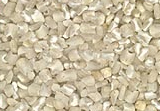Canjica
A traditional Brazilian dish made from corn
Canjica[edit | edit source]
Canjica is a traditional Brazilian dish made from white or yellow corn kernels, which are cooked with milk, sugar, and spices to create a sweet, creamy dessert. It is particularly popular during the Festa Junina, a Brazilian festival celebrated in June.
Preparation[edit | edit source]
The preparation of canjica begins with soaking the dry corn kernels overnight to soften them. The soaked kernels are then cooked in a mixture of milk and water until they become tender. Sugar is added to sweeten the dish, and it is often flavored with cinnamon and cloves. Some variations include coconut milk, peanuts, or sweetened condensed milk to enhance the flavor and richness of the dessert.
Cultural significance[edit | edit source]
Canjica holds a special place in Brazilian culture, especially during the Festa Junina celebrations, which are held in honor of Saint John and other saints. During these festivities, canjica is served alongside other traditional foods such as pé-de-moleque, pamonha, and quentão. The dish is enjoyed by people of all ages and is a symbol of the warmth and hospitality of Brazilian gatherings.
Variations[edit | edit source]
While the basic recipe for canjica remains the same, there are regional variations across Brazil. In some areas, canjica is made with yellow corn, giving it a distinct color and flavor. In the northeastern region, it is common to add coconut and peanuts, while in the southern regions, canjica may be prepared with sweetened condensed milk for added sweetness.
Related pages[edit | edit source]
Search WikiMD
Ad.Tired of being Overweight? Try W8MD's physician weight loss program.
Semaglutide (Ozempic / Wegovy and Tirzepatide (Mounjaro / Zepbound) available.
Advertise on WikiMD
|
WikiMD's Wellness Encyclopedia |
| Let Food Be Thy Medicine Medicine Thy Food - Hippocrates |
Translate this page: - East Asian
中文,
日本,
한국어,
South Asian
हिन्दी,
தமிழ்,
తెలుగు,
Urdu,
ಕನ್ನಡ,
Southeast Asian
Indonesian,
Vietnamese,
Thai,
မြန်မာဘာသာ,
বাংলা
European
español,
Deutsch,
français,
Greek,
português do Brasil,
polski,
română,
русский,
Nederlands,
norsk,
svenska,
suomi,
Italian
Middle Eastern & African
عربى,
Turkish,
Persian,
Hebrew,
Afrikaans,
isiZulu,
Kiswahili,
Other
Bulgarian,
Hungarian,
Czech,
Swedish,
മലയാളം,
मराठी,
ਪੰਜਾਬੀ,
ગુજરાતી,
Portuguese,
Ukrainian
Medical Disclaimer: WikiMD is not a substitute for professional medical advice. The information on WikiMD is provided as an information resource only, may be incorrect, outdated or misleading, and is not to be used or relied on for any diagnostic or treatment purposes. Please consult your health care provider before making any healthcare decisions or for guidance about a specific medical condition. WikiMD expressly disclaims responsibility, and shall have no liability, for any damages, loss, injury, or liability whatsoever suffered as a result of your reliance on the information contained in this site. By visiting this site you agree to the foregoing terms and conditions, which may from time to time be changed or supplemented by WikiMD. If you do not agree to the foregoing terms and conditions, you should not enter or use this site. See full disclaimer.
Credits:Most images are courtesy of Wikimedia commons, and templates, categories Wikipedia, licensed under CC BY SA or similar.
Contributors: Prab R. Tumpati, MD

